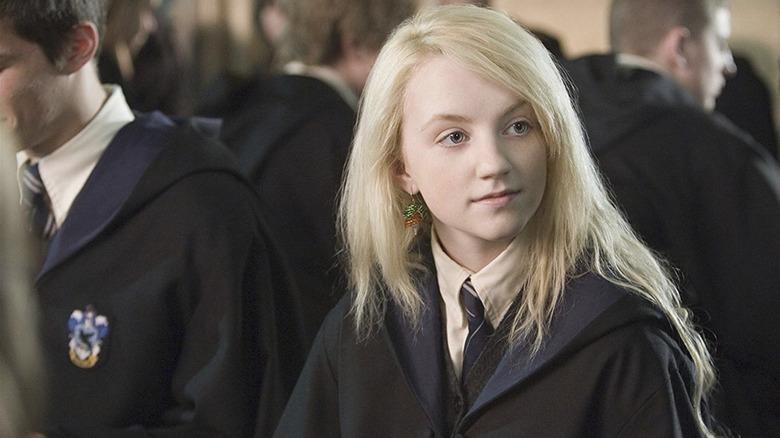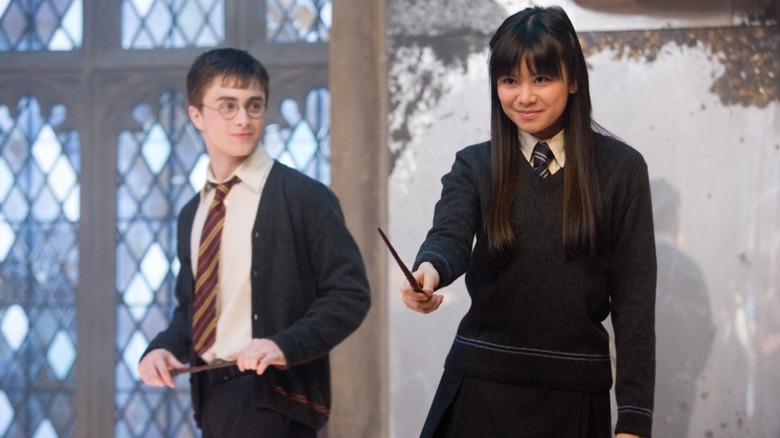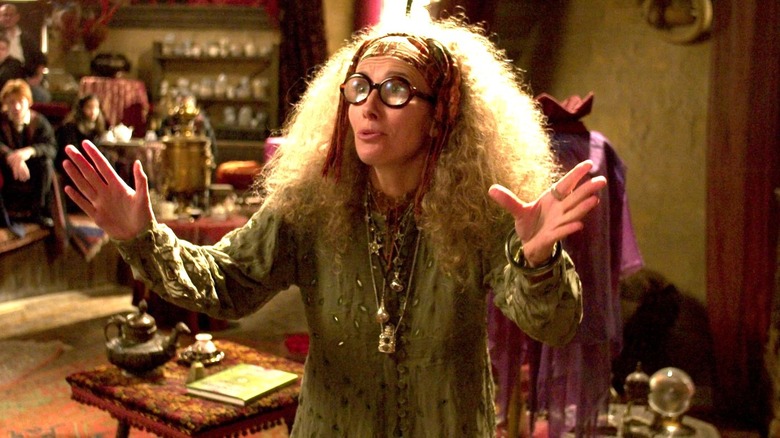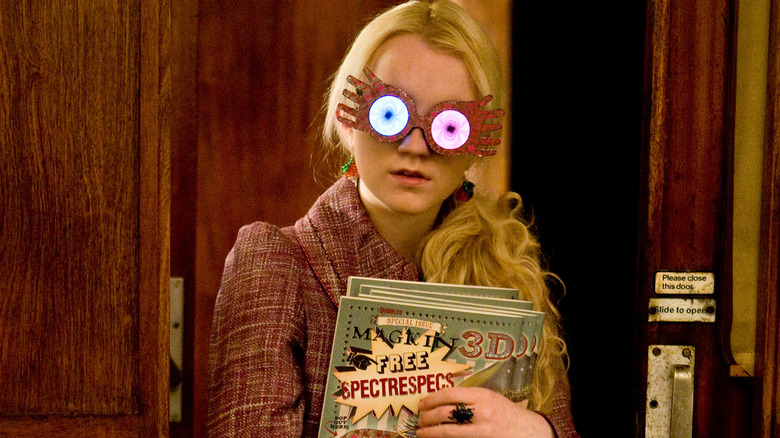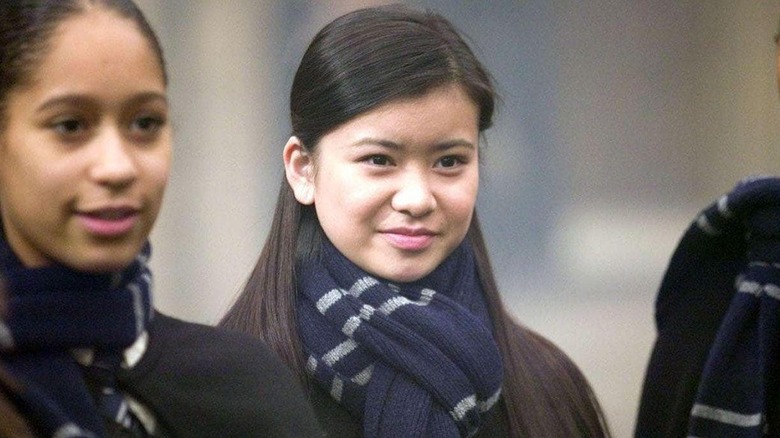Harry Potter's Ravenclaw Traits Explained
Although Hufflepuff is often considered the most neglected of the four Hogwarts houses in the "Harry Potter" franchise, there's a good argument to be made that Ravenclaw's got it even worse. At least Hufflepuff has that lovable underdog reputation that always garners sympathy; Ravenclaw is characterized as the nerdy house, and they're not even that good at being nerdy. They're consistently outdorked by Hermione Granger, a Gryffindor student, who is seemingly the only kid in Harry's grade who raises her hand in class. Even the books' other famous bookish character, Percy Weasley, is a proud Gryffindor too.
House Ravenclaw, with its sigil of an eagle and its blue and bronze color scheme, was founded by Rowena Ravenclaw over a thousand years before the series began. The house supposedly has a rich history and a reputation for holding the brightest students Hogwarts has to offer, so why doesn't it feel like it? Why do they feel like such an afterthought, even after appearing in seven books and eight movies?
What are the key traits of a Ravenclaw student?
As explained by the Sorting Hat in the first book, House Ravenclaw is where "those of wit and learning will always find their kind." He sang that Ravenclaw was a good fit for any students who had a "ready mind," and described the house as "wise and old."
If there's a flaw to the Ravenclaws, it's that they apparently have a tendency to be a bit cold in their pursuit of knowledge. At least according to Pottermore — an official website for the series throughout the 2010s — Ravenclaw students were rumored to be so competitive in their studies that they would often backstab each other to get ahead. This is a quality that implies that, if the Slytherin house is ever disbanded (as it should be!), many of those Slytherin students would be sorted into Ravenclaw. Slytherin's known as the cunning house, after all, and Ravenclaws are perfectly capable of being cunning.
Although Ravenclaws are famous for being smart, the books really emphasize the idea that intelligence comes in different shapes and forms. That's why Ravenclaw is home to a lot of strange characters like Uric the Oddball and Xenophilius Lovegood, people who seem like they'd fall right down the QAnon rabbit hole if they existed in our modern Muggle world. The intelligence Ravenclaws possess can manifest itself in ways that, at first glance at least, don't seem to make any sense at all.
Who are the most prominent Ravenclaw characters?
For the first two books, the most prominent Ravenclaw in the series is Professor Filius Flitwick, a minor character who seems nice but is rarely given anything of note to do. The third book introduces a more prominent Ravenclaw professor: Sybill Trelawney, who teaches divination. Making Trelawney a Ravenclaw felt like an odd choice at first, because she's implied to be a total fraud. But at the end of "Prisoner of Azkaban," she proves her worth, delivering a prophecy that's real and helpful.
"Prisoner of Azkaban" also soft-launches Harry's romance with Cho Chang, a Ravenclaw student who'd get a lot more focus in the next two books before being tossed back into the sidelines. Cho is implied to be a good student, but her main qualities in the fourth book are that she's nice and pretty, while her main quality in the fifth book is that she's depressed over her boyfriend Cedric's death.
It's in "The Order of the Phoenix" that the series introduces its best, most memorable Ravenclaw student: Luna Lovegood. Sweet but eccentric, Luna is often looked down on by the book-smart Hermione, but her unorthodox approach to learning comes in handy nonetheless. She teaches Harry about thestrals, and her family newspaper, The Quibbler, turns out to be a valuable tool in helping Harry fight back against the Daily Prophet's propaganda. Luna may be nicknamed Loony by the other students, but beyond all the weirdness, she does seem to have a good head on her shoulders.
Were some characters falsely sorted into Ravenclaw?
It seemed like author (and deeply problematic public figure) J.K. Rowling loved introducing a seemingly airheaded character and making them a Ravenclaw as a hint not to underestimate them. Both Trelawney and Lovegood are repeatedly dismissed by the other characters as unserious fools, and (especially in Lovegood's case) this often turns out to be a mistake. Still, it's hard not to wonder why there are so few prominent Ravenclaws in the series who actually embody the brainy stereotype of the house. Even after seven books, the most Ravenclaw-y character is still Hermione, but she's a proud Gryffindor.
One of the few bright spots in the upcoming "Harry Potter" reboot TV show (which hasn't been promising so far) is that the show will have an opportunity to show more of the Ravenclaw students, making a stronger case for why these Ravenclaws are considered so smart.
It's easy to imagine a TV show having the time to throw in a fun subplot of Hermione beefing with a Ravenclaw girl for the best grade in a class, or introducing Luna and Cho earlier than they are in the books. Cho was a fellow student from day one, and Luna joined Hogwarts in "Chamber of Secrets," but neither was introduced in the books or movies until later on. With the benefit of hindsight, the show has the opportunity to include more Ravenclaw representation in Harry's earlier years.
Are the Ravenclaw overrated?
This might seem petty, but we need to talk about how Ravenclaw does not win a single house cup during Harry's entire time at Hogwarts, nor have they won in the years immediately preceding him. A house as smart as Ravenclaw should be killing it in this competition, but they're instead settling for third or even fourth place each school year. What's up with that?
Perhaps the series was making a point about how brains don't count for much if there's no heart to go along with it. The bravery of Gryffindors is valued more in the text than the smarts of the Ravenclaws, and the moral fortitude of the Hufflepuffs is valued more, too. This point is underlined near the end of "The Deathly Hallows," during the Battle of Hogwarts, where it's largely Gryffindor and Hufflepuff students sticking around to fight the Death Eaters. Far more Ravenclaws stick around than the Slytherins, of course, but the Ravenclaw numbers are still notably below the other two houses.
The Slytherins may be Rowling's least favorite house in the series (though she admittedly seems more pro-Slytherin these days), but I'd suspect she'd never been that fond of Ravenclaw either. Given how disinterested the books are in focusing on the more typical Ravenclaw students, it seems like straightforward book-smartness is not something Rowling finds commendable.
It seems like the books' stance on Ravenclaw can be best summed up in one Harry and Hermione exchange at the end of the first book. Harry says he's not as good a wizard, and Hermione responds, "Books! And cleverness! There are more important things—friendship and bravery." But whereas Hermione would prove herself to be a true friend capable of great bravery, few Ravenclaws in the series get the chance to do the same.
